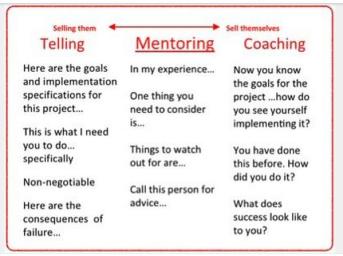In discussions about coaching with colleagues and members of my PLN I frequently find myself talking about clarity of intent and the terms of engagement associated with the coaching process.
In John Campbell‘s tweet below, the key word for me is expectation. In this instance he was responding to a question about the distinctions between coaching and mentoring. For me, the issue here is about clarity around what is expected, invited or solicited when entering into any collaborative engagement with another.

How well do we clarify the terms of engagement when we enter into coaching relationships?
When I coach teachers in my school, a significant proportion of the first session is devoted to setting the foundation and establishing the coaching agreement. The International Coaching Federation (ICF) recommend setting the foundation as the first component of their Core Competencies. Incidentally, the ICF competencies and their detailed descriptors provide a helpful framework for all aspects of a coach’s work.
Christian van Nieuwerburgh (2014) provides a useful reference table to assist with the formulation of a coaching contract and he stresses the importance of establishing these professional parameters before embarking on any coaching conversation. My adaptation of this table is provided below.
This checklist has morphed into a Coaching Agreement that is now used at the start of each coaching cycle. This might seem quite formal and business-like but the agreement provides a point of reference for the first coaching session, and when reviewing how the process is going. The use of an agreement, or at least discussing the terms of engagement with the coachee, is perhaps even more important in a school context. I say this because a coaching conversation is a managed professional conversation distinct from the more familiar day-to-day conversations about practice that may occur with colleagues with whom we already have a level of comfort and familiarity. These more convivial conversations often lack the level of challenge and accountability that are part of an effective coaching conversation. Generally, in polite interactions with one another we shy away from the level of challenge that might occur in a coaching context. A coaching conversation is not just a conversation.
- Is there anything on the checklist or the agreement that you would change or add?
- How do you set the parameters for your coaching interactions?
Please feel free to leave a comment or question to expand the conversation.
Reference:
van Nieuwerburgh, C. (2014). An introduction to coaching skills: A practical guide. London, England: Sage.
Companion website with video illustrations of practice:
http://studysites.uk.sagepub.com/vannieuwerburgh/study/default.htm








